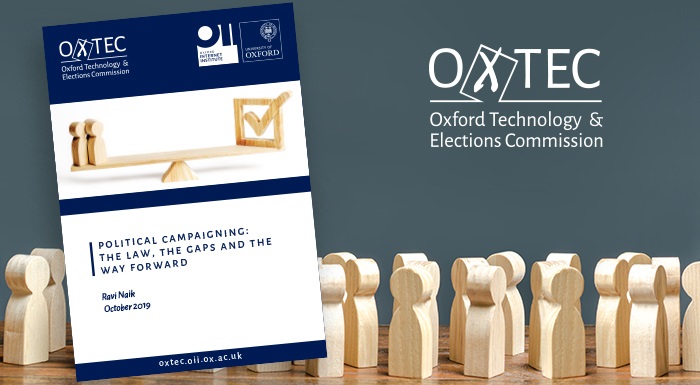‘Political Campaigning: The Law, The Gaps and The Way Forward’ is a report authored by Ravi Naik with assistance from Julianne Kerr Morrison, on behalf of OxTEC, and examines the scope of the current law concerning political campaigning and the current regulatory gaps in this area.
The report also sets out a series of future recommendations for policymakers designed to improve the regulation of political campaigning in the digital age.
Key recommendations:
Codes of Practice and a Regulator – developing a detailed and comprehensive code of practice for use of political data through a public consultation, with outcomes applied by a uniform regulator, such as Ofcom.
Donation transparency – legislative clarification regarding definitions of ‘donations’ and ‘permissible donors’.
Spending transparency – introducing meaningful transparency on spending allowing for clear and accountable expenditure including non-cash donations.
A review of the exemptions for democratic engagement under the Data Protection Act 2018, which aims to limit the misuse of political data.
Campaign messaging transparency – provide clarity on the Electoral Commission legislative amendment regarding imprints on digital campaign material, to ensure the source of material is clear to individuals
Extending timing of regulations beyond the governments’ online harm proposals to cover electoral regulations generally
These proposals will feed into a final report by the Commission, which was convened by the Oxford Internet Institute at the University of Oxford.
Ravi Naik, Partner at ITN Solicitors and co-author of the report said:
“Electoral laws need to keep pace with the development of technology. A challenge remains in striking a balance between the need for regulation to protect the democratic process and avoiding, at the same time, doing more harm than good through negatively affecting free speech and other fundamental rights. Our new report sets out a series of recommendations about how we can adapt the current regulatory framework to address the explosion in digital campaigning.
“Ultimately we’re calling for an evolution of the current system rather than a revolution through an entirely new legal regime. The law needs to be tweaked and extended, rather than overhauled. We hope our report provides food for thought for the OxTEC Commissioners offering some practical solutions as they consider their final recommendations.”
Professor Philip Howard, Director of the Oxford Internet Institute (OII) and OxTEC Commissioner said:
“Political campaign material in the UK is largely unregulated and policy and regulation has not kept pace with the development of digital campaigning tools and techniques. New technologies and platforms have benefited democracies by engaging new and younger audiences but we need to ensure that the legal framework for political campaigning is fit for purpose in the digital age. This detailed report will help the Commission address how we ensure the fundamental long-term integrity of the electoral system in the UK.”
OxTEC convened by the OII, consists of academics, researchers, technology experts and policymakers, and was established to explore how to safeguard democracy from the potentially disruptive influences of modern technology.
The Commission is due to publish a full report later this month based on the key findings from previous reports together with the latest work from the OII-led Computational Propaganda research project.
Download the full report here.
For more information please contact call +44 (0)1865 287 210 or contact press@oii.ox.ac.uk.



